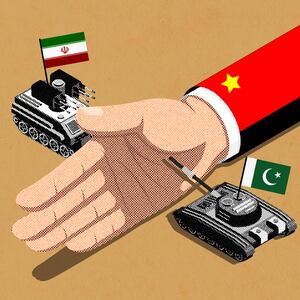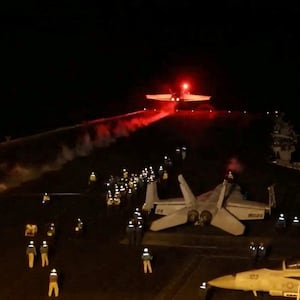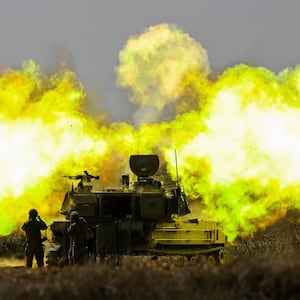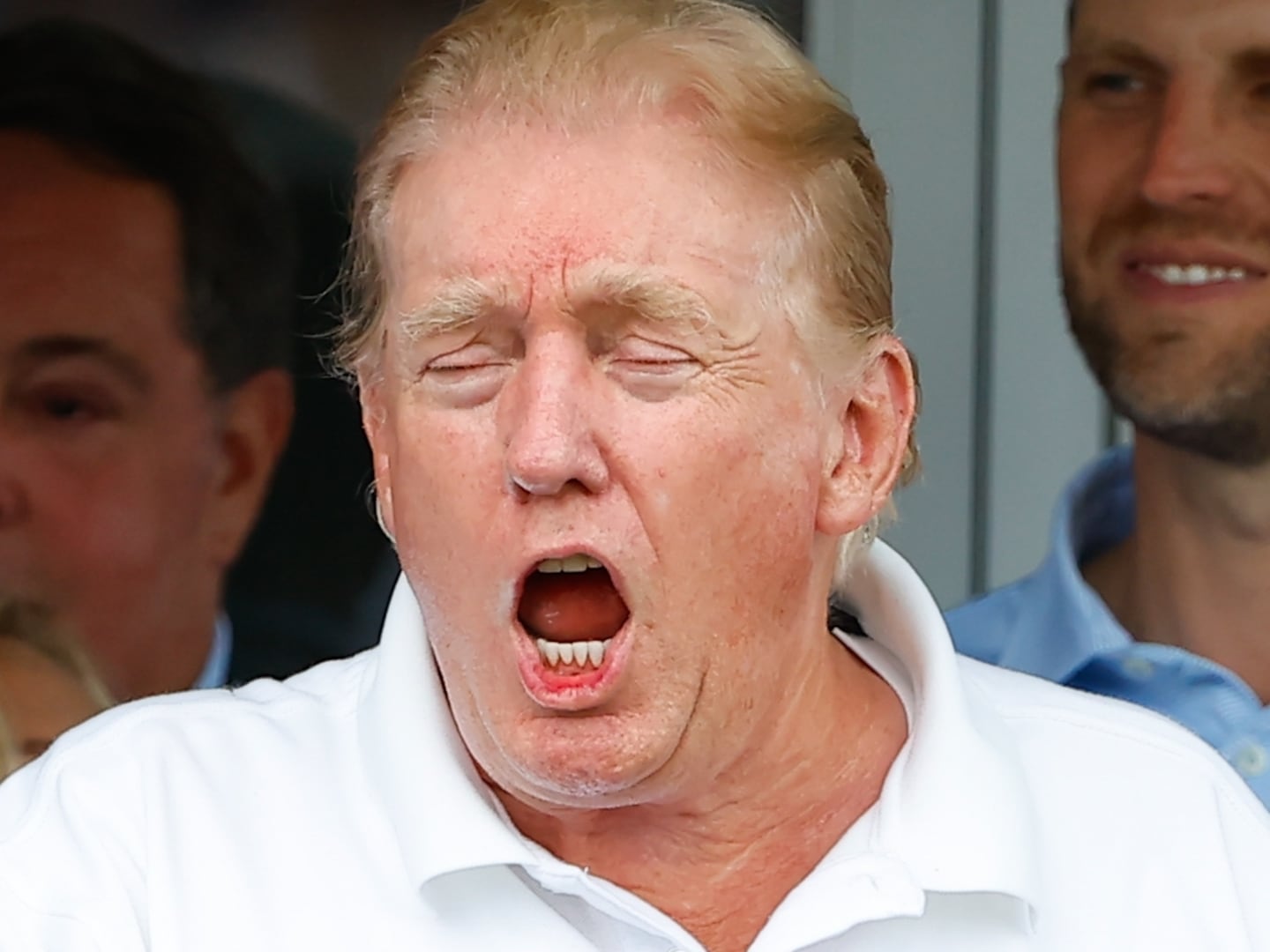In response to a Kataib Hezbollah attack Saturday on Ain Al-Asad Airbase that houses Iraqi and American troops, U.S. fighter jets on Wednesday bombed three facilities used by Iranian-backed militias in Jurf Al-Sakhr, destroying arms depots and training schools for missiles and explosive drones.
The militias have launched at least 130 attacks on U.S. forces in Iraq and Syria, since October, with the Biden administration responding a handful of times. America labels its responses “unilateral” to avoid embarrassing Iraqi Prime Minister Muhammad Al-Sudani, whose coalition relies on a pro-Iran parliamentary majority. Sudani could end U.S. presence in Iraq with a signature—but has yet to do so.
Why Sudani’s reluctance? The most plausible answer is that Iran itself fears U.S. sanctions on Iraq if Washington was ever forced to withdraw its troops. Iran—whose economy suffers immensely under heavy American sanctions—relies on three lifelines: oil exports to China in spite of U.S. sanctions, illicit trade (including narcotics and racketeering), and Iraq.
When America killed top Iranian Revolutionary Guard Corps (IRGC) general Qassem Soleimani and his Iraqi lieutenant Abu-Mahdi Al-Muhandes in Jan. 2020, the Iraqi parliament convened to vote on forcing the caretaker cabinet of Adel Abdul-Mahdi to send a letter that would have ended the presence of the anti-ISIS coalition troops, including 2,500 U.S. military advisors.
As Iraqis debated their law, then-President Donald Trump threatened Baghdad: “We will charge them sanctions like they’ve never seen before, ever. It’ll make Iranian sanctions look somewhat tame.”
Washington’s economic threat paid off. The Kurdish and Sunni blocs, which made up slightly less than half of Iraq’s 329-member parliament, skipped the session. The leader of the biggest Sunni bloc, Muhammad Al-Halbousi, then serving as speaker, was caught on a leaked tape arguing against the vote during the parliamentary debate. “One of the measures that the international community might take [in retaliation to this vote], might be to stop its financial dealing with Iraq,” Halbousi said.

Hundreds of protesters gather to protest against the attack by Iran's Islamic Revolutionary Guard Corps (IRGC) on the northern Iraqi city of Erbil last week in Akre, district of Duhok, Iraq on Jan. 22, 2024.
Muhammet Bamerni/Anadolu via Getty ImagesOn Monday, the U.S. Treasury Department imposed sanctions on the Fly Baghdad airline, accusing it of using “seemingly legitimate business as cover for funding and facilitating [Iran-backed militias’] attacks.”
Iraq is the second biggest oil producer in OPEC, with four million barrels a day, raking in $120 billion a year. The Iraqi oligarchs, among the most corrupt in the world, need this money to fund their patronage networks. Iran too, needs Iraq’s money.
Iran sells gas and electricity to Iraq. The Biden administration has issued waivers that allowed Baghdad to settle over $10 billion it owed Tehran in 2023. Iran also siphons some or all of $10 billion in Iraqi cash through small exchange shops.
The cherry on top is $3 billion that Baghdad spends on 160,000 pro-Iran Shia militia fighters. For comparison, consider that the 170,000-strong professional Jordanian Army—with its F-16 fleet and Blackhawk helicopters, navy, and infantry, including artillery and tanks—costs $2 billion a year.
The Iraqi militias’ payroll is secretive, thus confirming suspicions that both Iraq’s regular army and the Iran-backed militias are stuffed with “ghost soldiers,” whose salaries are cashed by corrupt senior Iraqi officials and their bosses in Tehran.
Whichever way Tehran uses Baghdad’s money, it collects a hefty sum, especially when measured against Tehran’s annual expenditures of $49 billion. The Islamic Republic has every reason to want to avoid U.S. sanctions on Iraq, which Tehran fears might come if it instructs Sudani to send the letter to Washington demanding withdrawal.
But why strike U.S. troops in the first place, if Iran and its militias want to avoid an American withdrawal? The answer is multifold.
Domestically, rival Iraqi militias try to outbid one another and brandish their anti-West credentials by targeting U.S. troops in Iraqi bases. Regionally, Iran always reminds the world that it has Baghdad under its thumb, and that the continued presence of American military personnel in Iraq is by Tehran’s permission and under its mercy.
This is why Sudani’s statements have generated headlines but said little. “The end of the international coalition mission is a necessity,” the Iraqi PM said, without setting a date. In other statements, Sudani usually announces formation of committees to discuss withdrawal with Washington.
On his X account, where he usually comments on issues in three languages—Arabic, Kurdish, and English—Sudani congratulated the Iraqi soccer team for beating Vietnam at the Asian Cup on Wednesday but did not comment on the U.S. strike on the Iran-backed militias in Jurf Al-Sakhr.
Sudani, instead, let his military advisor Yehia Abdullah put out a statement in which he bashed America for striking a base that housed pro-Iran militias and Iraqi military. But Jurf Al-Sakhr houses no Iraqi troops, who are deployed alongside their American comrades at Ain Al-Asad, which often comes under militia fire, per statements from the Iraqi air force based there.
“We call on the international community to take responsibility in shoring up peace and security and prohibiting all the [American] violations that threaten Iraq and its stability,” Abdullah said. The statement was issued in Arabic only, perhaps to placate rivals, and certainly not to ask America to withdraw. So far, Iran does not seem to want that.









